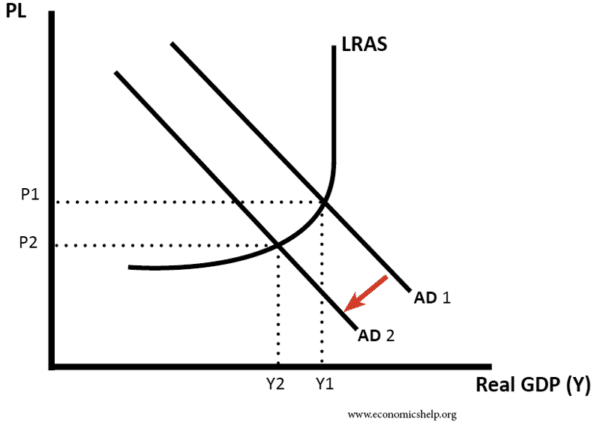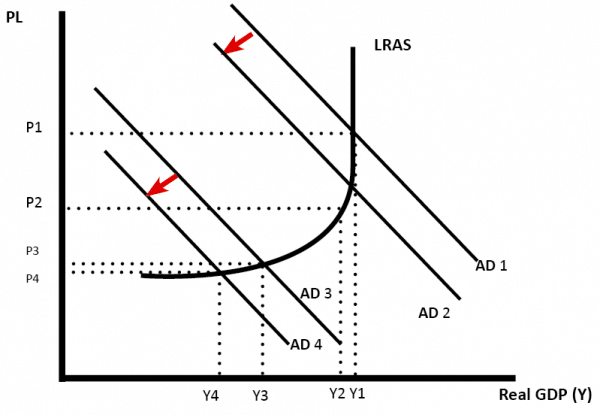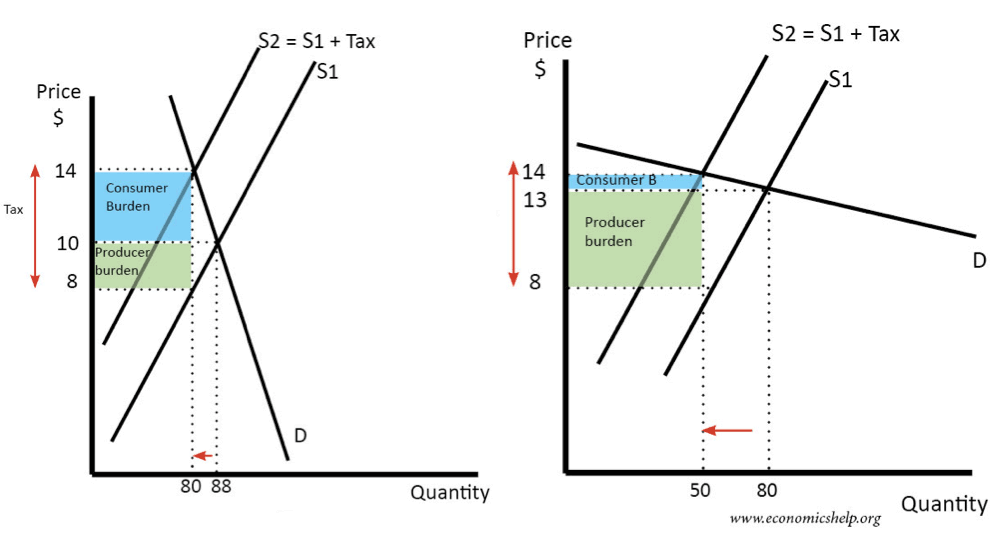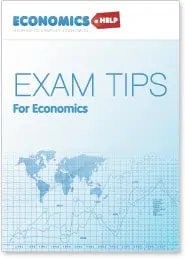

Tips for writing economics essays
Some tips for writing economics essays Includes how to answer the question, including right diagrams and evaluation – primarily designed for A Level students.
1. Understand the question
Make sure you understand the essential point of the question. If appropriate, you could try and rephrase the question into a simpler version.
For example:
Q. Examine the macroeconomic implications of a significant fall in UK House prices, combined with a simultaneous loosening of Monetary Policy.
In plain English.
- Discuss the effect of falling house prices on the economy
- Discuss the effect of falling interest rates (loose monetary policy) on economy
In effect, there are two distinct parts to this question. It is a valid response, to deal with each separately, before considering both together.
It helps to keep reminding yourself of the question as you answer. Sometimes candidates start off well, but towards the end forget what the question was. Bear in mind, failure to answer the question can lead to a very low mark.
2. Write in simple sentences
For clarity of thought, it is usually best for students to write short sentences. The main thing is to avoid combining too many ideas into one sentence. If you write in short sentences, it may sound a little stilted; but it is worth remembering that there are no extra marks for a Shakespearian grasp of English. (at least in Economics Exams)
Look at this response to a question:
Q. What is the impact of higher interest rates?
Higher interest rates increase the cost of borrowing. As a result, those with mortgages will have lower disposable income. Also, consumers have less incentive to borrow and spend on credit cards. Therefore consumption will be lower. This fall in consumption will cause a fall in Aggregate Demand and therefore lead to lower economic growth. A fall in AD will also reduce inflation.

I could have combined 1 or 2 sentences together, but here I wanted to show that short sentences can aid clarity of thought. Nothing is wasted in the above example.
Simple sentences help you to focus on one thing at once, which is another important tip.
3. Answer the question
Quite frequently, when marking economic essays, you see a candidate who has a reasonable knowledge of economics, but unfortunately does not answer the question. Therefore, as a result, they can get zero for a question. It may seem harsh, but if you don’t answer the question, the examiner can’t give any marks.
At the end of each paragraph you can ask yourself; how does this paragraph answer the question? If necessary, you can write a one-sentence summary, which directly answers the question. Don’t wait until the end of the essay to realise you have answered a different question.
Discuss the impact of Euro membership on UK fiscal and monetary policy?
Most students will have revised a question on: “The benefits and costs of the Euro. Therefore, as soon as they see the Euro in the title, they put down all their notes on the benefits and costs of the Euro. However, this question is quite specific; it only wishes to know the impact on fiscal and monetary policy.
The “joke” goes, put 10 economists in a room and you will get 11 different answers. Why? you may ask. The nature of economics is that quite often there is no “right” answer. It is important that we always consider other points of view, and discuss various different, potential outcomes. This is what we mean by evaluation.

Macro-evaluation
- Depends on the state of the economy – full capacity or recession?
- Time lags – it may take 18 months for interest rates to have an effect
- Depends on other variables in the economy . Higher investment could be offset by fall in consumer spending.
- The significance of factors . A fall in exports to the US is only a small proportion of UK AD. However, a recession in Europe is more significant because 50% of UK exports go to EU.
- Consider the impact on all macroeconomic objectives . For example, higher interest rates may reduce inflation, but what about economic growth, unemployment, current account and balance of payments?
- Consider both the supply and demand side . For example, expansionary fiscal policy can help to reduce demand-deficient unemployment, however, it will be ineffective in solving demand-side unemployment (e.g. structural unemployment)
Example question :
The effect of raising interest rates will reduce consumer spending.
- However , if confidence is high, higher interest rates may not actually discourage consumer spending.

If the economy is close to full capacity a rise in interest rates may reduce inflation but not reduce growth. (AD falls from AD1 to AD2)
- However , if there is already a slowdown in the economy, rising interest rates may cause a recession. (AD3 to AD3)
Micro-evaluation
1. The impact depends on elasticity of demand

In both diagrams, we place the same tax on the good, causing supply to shift to the left.
- When demand is price inelastic, the tax causes only a small fall in demand.
- If demand is price elastic, the tax causes a bigger percentage fall in demand.
2. Time lag
In the short term, demand for petrol is likely to be price inelastic. However, over time, consumers may find alternatives, e.g. they buy electric cars. In the short-term, investment will not increase capacity, but over time, it may help to increase a firms profitability. Time lags.
3. Depends on market structure
If markets are competitive, then we can expect prices to remain low. However, if a firm has monopoly power, then we can expect higher prices.
4. Depends on business objectives
If a firm is seeking to maximise profits, we can expect prices to rise. However, if a firm is seeking to maximise market share, it may seek to cut prices – even if it means less profit.
5. Behavioural economics
In economics, we usually assume individuals are rational and seeking to maximise their utility. However, in the real world, people are subject to bias and may not meet expectations of classical economic theory. For example, the present-bias suggest consumers will give much higher weighting to present levels of happiness and ignore future costs. This may explain over-consumption of demerit goods and under-consumption of merit goods. See: behavioural economics

Exam tips for economics – Comprehensive e-book guide for just £5
9 thoughts on “Tips for writing economics essays”
I really want to know the difference between discussion questions and analysis questions and how to answer them in a correct way to get good credit in Economics
Analysis just involves one sided answers while Discussion questions involve using two points of view
This is a great lesson learnd by me
how can I actually manage my time
The evaluation points in this article are really useful! The thing I struggle with is analysis and application. I have all the knowledge and I have learnt the evaluation points like J-curve analysis and marshall learner condition, but my chains of reasoning are not good enough. I will try the shorter sentences recommended in this article.
What kind of method for costing analysis is most suitable for a craft brewery, in order to analyze the cost of production of different types of beer_
Really useful!Especially for the CIE exam papers
Does anyone know how to evaluate in those advantages/disadvantages essay questions where you would basically analyse the benefits of something and then evaluate? Struggling because wouldn’t the evaluation just be the disadvantages ?? Like how would you evaluate without just stating the disadvantage?
This is an excellent source of adbvise
Leave a comment Cancel reply

IMAGES
VIDEO